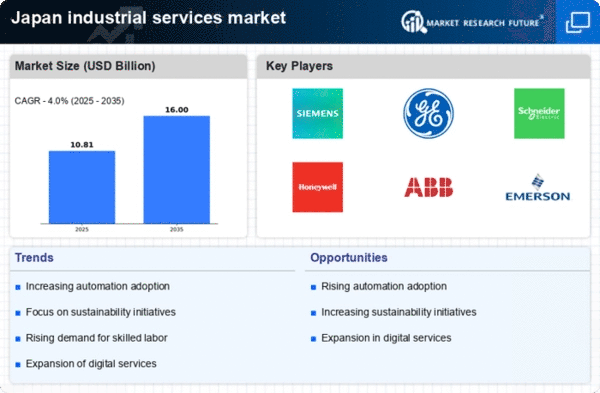Aging Workforce Challenges
Japan's industrial services market is significantly influenced by the challenges posed by an aging workforce. As the population ages, many skilled workers are retiring, leading to a shortage of labor in critical sectors. This demographic shift necessitates the adoption of advanced technologies and services to maintain productivity levels. The government has recognized this issue and is promoting initiatives to attract younger workers into the industrial sector. Consequently, service providers are increasingly focusing on training and upskilling programs to bridge the skills gap. This trend is expected to drive growth in the industrial services market as companies seek external expertise to manage their workforce challenges.
Rising Demand for Automation
The industrial services market in Japan is experiencing a notable increase in demand for automation solutions. This trend is driven by the need for enhanced efficiency and productivity across various sectors, including manufacturing and logistics. As companies seek to reduce operational costs and improve output quality, the adoption of automated systems is becoming more prevalent. According to recent data, the automation market in Japan is projected to grow at a CAGR of approximately 8% over the next five years. This growth is likely to stimulate the industrial services market, as service providers adapt to offer specialized support for automation technologies, including installation, maintenance, and training.
Digital Transformation Initiatives
The push for digital transformation is reshaping the industrial services market in Japan. Companies are increasingly adopting digital tools and platforms to enhance operational efficiency and customer engagement. This shift is driven by the need to remain competitive in a rapidly evolving market landscape. As organizations implement IoT, big data analytics, and cloud computing, the demand for specialized services to support these technologies is rising. The industrial services market is expected to see a surge in demand for consulting, integration, and ongoing support services. Industry reports suggest that the digital services market could grow by 10% annually, indicating a robust opportunity for service providers to align their offerings with digital transformation trends.
Increased Focus on Safety Standards
Safety regulations in Japan are becoming increasingly stringent, impacting the industrial services market. Companies are required to comply with enhanced safety standards to protect workers and minimize risks. This regulatory environment is prompting businesses to invest in safety training, equipment, and services. The industrial services market is likely to benefit from this trend, as service providers offer specialized safety audits, compliance consulting, and training programs. Recent statistics indicate that the safety services sector is expected to grow by 6% annually, reflecting the heightened emphasis on workplace safety. This growth presents opportunities for service providers to expand their offerings and cater to the evolving needs of industries.
Sustainability and Environmental Compliance
Sustainability is becoming a critical driver for the industrial services market in Japan. Companies are increasingly required to adhere to environmental regulations and adopt sustainable practices. This shift is not only a response to regulatory pressures but also a reflection of changing consumer preferences towards eco-friendly products and services. As a result, the demand for services that assist in achieving sustainability goals is on the rise. Service providers are likely to offer solutions such as waste management, energy efficiency consulting, and carbon footprint assessments. The market for environmental services is projected to grow by 7% annually, highlighting the potential for industrial services providers to capitalize on this trend.
















